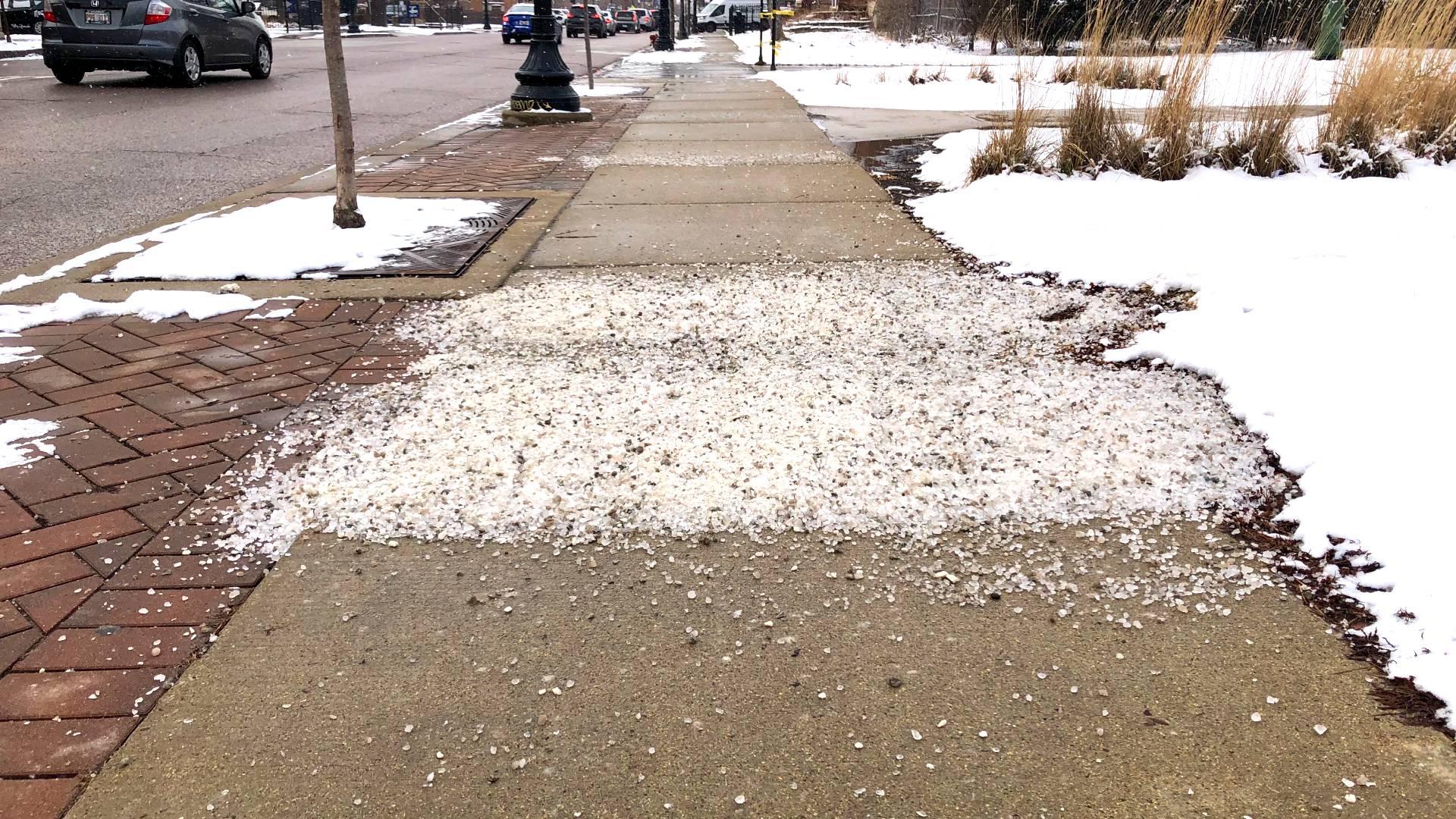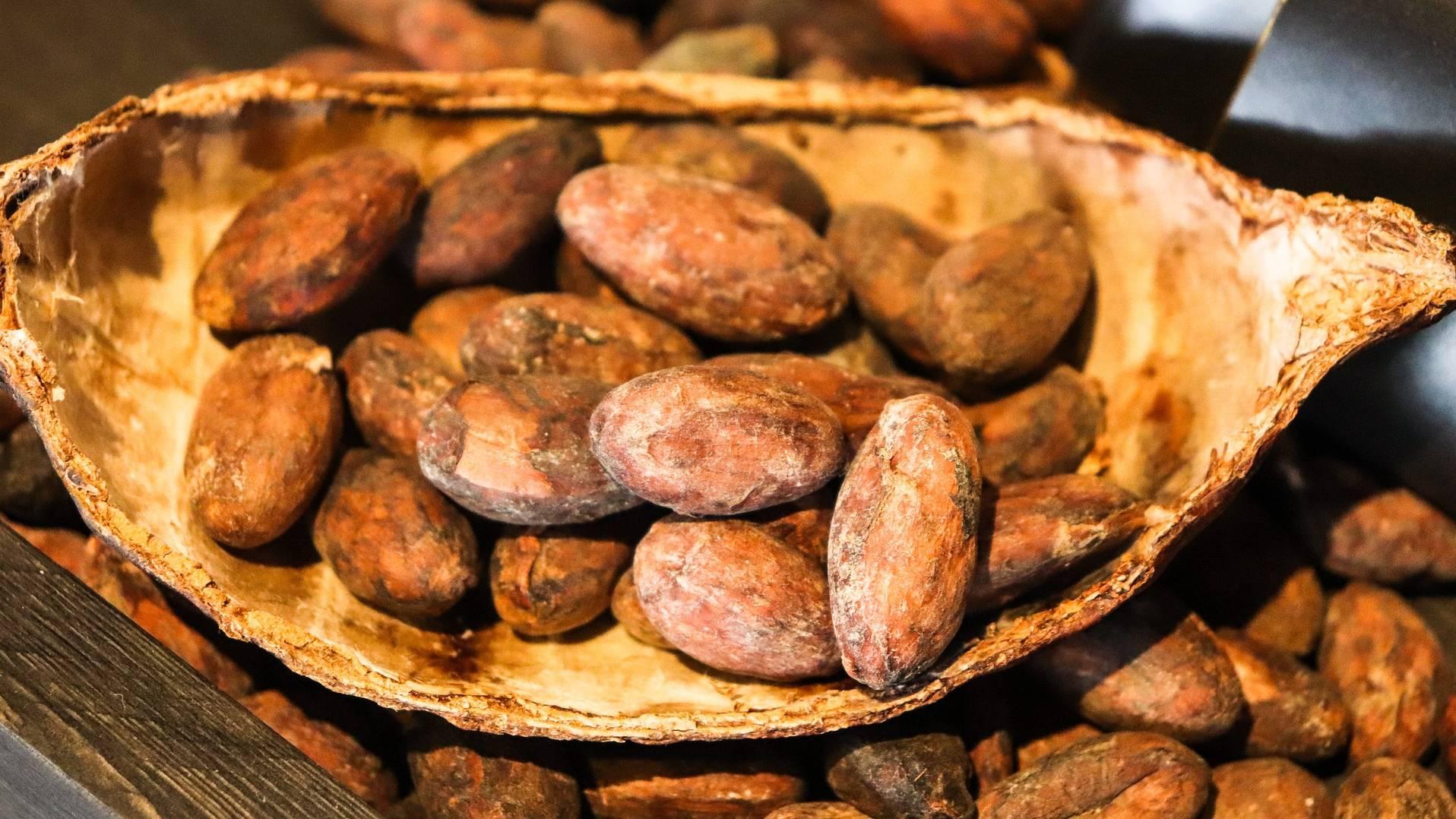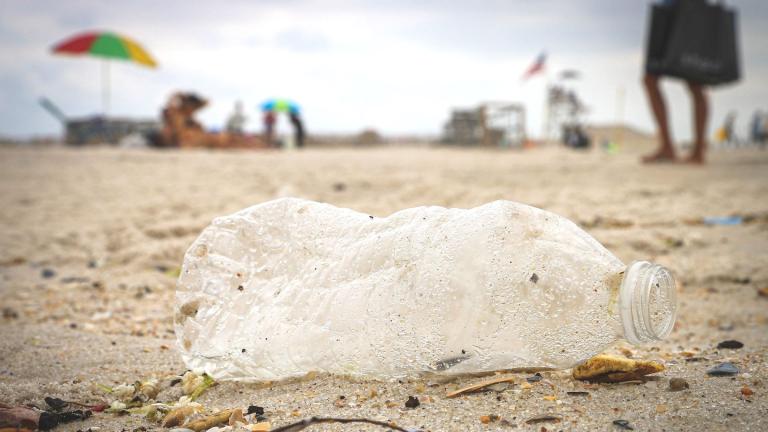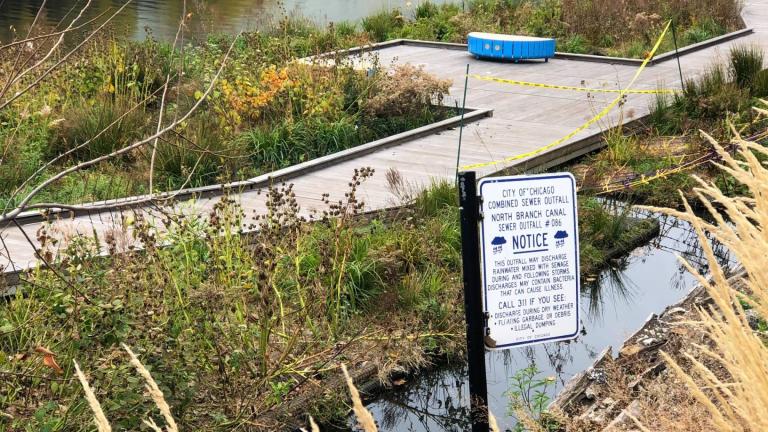 Foster Avenue, in the North Park neighborhood. Experts say a single mug of salt is enough for 10 squares of sidewalk. (Patty Wetli / WTTW News)
Foster Avenue, in the North Park neighborhood. Experts say a single mug of salt is enough for 10 squares of sidewalk. (Patty Wetli / WTTW News)
Midwestern road diets are heavy on the salt, and that’s a health hazard for the region’s waters.
Lake Michigan — the source of drinking water for some 10 million people — is nearly eight times saltier today than it was in the 1800s, a significant portion of that change coming since 1980, according to a 2021 study.
One of the major contributors to what researchers have dubbed “freshwater salinization syndrome“ is road salt runoff.
There’s no question deicers applied to slippery roads and sidewalks are a godsend to motorists and pedestrians. But a more-is-better philosophy has led to overuse, in part because of concerns about liability.
To tackle the issue, Wisconsin is attempting a carrot approach. (The state, via the Milwaukee River, dumps a considerable amount of salt into Lake Michigan.)
Legislation has been introduced to establish a voluntary training and certification program for snow removal contractors, in which they learn about and implement best salting practices. In return, certified companies would earn immunity from “slip and fall” lawsuits, the Milwaukee Journal Sentinel reported.
New Hampshire has a similar law on the books, and Minnesota has a certification program. Minnesota reports reductions in salt use between 30% and 70% by participants.
Here’s what else caught our attention this week.
Astronomy
Scientists confirmed the discovery of 12 additional moons orbiting Jupiter, bringing the total to 92, the most satellites of any planet. That knocked Saturn down to second place, with 83 moons.
Earth still has just the one, which got us to wondering why, considering its singularity, our moon doesn’t have a cool name like Europa or Titan. It’s just a moon called “moon,” which is like having a pet cat called “cat.”
According to NASA, “Earth’s only natural satellite is simply called ‘the Moon’ because people didn’t know other moons existed until Galileo Galilei discovered four moons orbiting Jupiter in 1610.”
It’s not a good reason, but it’s a reason.
Alternative Energy
Honestly, sometimes it’s comforting to read about another city’s political dysfunction for a change.
Los Angeles City Council approved a plan to convert the city’s largest gas-fired power plant to hydrogen, and pretty much nobody seems happy with the decision — including climate activists.
Critics questioned the safety of hydrogen, the cost and the feasibility of the plan and have questioned whether the technology involved is even “green.”
Per the Los Angeles Times: “Adding to the skepticism over green hydrogen is that its loudest proponents are often fossil fuel companies. In Los Angeles, that would be Southern California Gas Co., the nation’s largest gas utility. Last year, the company proposed Angeles Link, a massive and potentially lucrative pipeline that would bring green hydrogen fuel to the L.A. Basin.”
Contamination
 Dust containing lead can settle on cacao beans as they ferment and dry outdoors. (Allybally4b / Pixabay)
Dust containing lead can settle on cacao beans as they ferment and dry outdoors. (Allybally4b / Pixabay)
Further proof that we are indeed living in the worst timeline:
This week, lawsuits were filed against several chocolate manufacturers for failing to disclose the levels of lead and cadmium in various dark chocolate brands.
The Seattle Times has an excellent explainer on how the heavy metals wind up in chocolate. In the spirit of TL;DR: Cacao trees pull cadmium from soil, and lead floating around in the air (a remnant of the not-so-good old days of leaded gasoline in cars) settles on cacao beans as they’re left to ferment and dry outdoors.
For the record, there’s no blanket warning against eating dark chocolate, but doctors advise moderation, especially for children and those who are pregnant or breastfeeding.
Cautious consumers can check the levels of lead and cadmium found in hundreds of chocolate bars, as tested by the nonprofit As You Sow.
Research
Everyone’s been so focused lately on ChatGPT and the threat it potentially poses to civilization as we know it, that we’ve taken our eyes off the ball.
Pigeons have been getting smarter, too.
Researchers at the University of Iowa studied pigeons’ problem-solving abilities and concluded that the birds’ processes of identifying patterns and making associations very much resembles the learning employed by artificial intelligence.
Tweet of the Week
Eat rubber, NASCAR.
These Common Goldeneyes were hurrying down the Chicago River yesterday. I think it was the music from North Park University's baseball practice - Van Halen's "Running with the Devil" pic.twitter.com/r7nW9WOjb3
— Bob Dolgan (@bobdolgan) February 9, 2023
Contact Patty Wetli: @pattywetli | (773) 509-5623 | [email protected]








